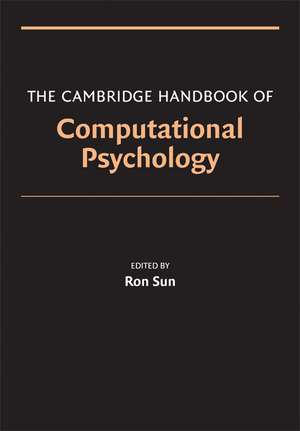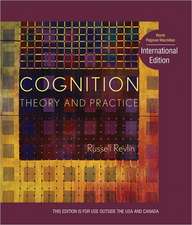The Cambridge Handbook of Computational Psychology: Cambridge Handbooks in Psychology
Editat de Ron Sunen Limba Engleză Paperback – 27 apr 2008
| Toate formatele și edițiile | Preț | Express |
|---|---|---|
| Paperback (1) | 493.96 lei 6-8 săpt. | |
| Cambridge University Press – 27 apr 2008 | 493.96 lei 6-8 săpt. | |
| Hardback (1) | 732.17 lei 6-8 săpt. | |
| Cambridge University Press – 27 apr 2008 | 732.17 lei 6-8 săpt. |
Din seria Cambridge Handbooks in Psychology
- 23%
 Preț: 1254.71 lei
Preț: 1254.71 lei - 11%
 Preț: 449.49 lei
Preț: 449.49 lei -
 Preț: 502.52 lei
Preț: 502.52 lei -
 Preț: 501.96 lei
Preț: 501.96 lei - 8%
 Preț: 426.60 lei
Preț: 426.60 lei -
 Preț: 486.56 lei
Preț: 486.56 lei - 5%
 Preț: 441.42 lei
Preț: 441.42 lei - 9%
 Preț: 1282.44 lei
Preț: 1282.44 lei -
 Preț: 494.25 lei
Preț: 494.25 lei - 8%
 Preț: 429.69 lei
Preț: 429.69 lei - 5%
 Preț: 397.85 lei
Preț: 397.85 lei - 23%
 Preț: 1246.12 lei
Preț: 1246.12 lei - 5%
 Preț: 439.60 lei
Preț: 439.60 lei - 19%
 Preț: 491.54 lei
Preț: 491.54 lei - 5%
 Preț: 718.49 lei
Preț: 718.49 lei -
 Preț: 511.59 lei
Preț: 511.59 lei - 8%
 Preț: 426.60 lei
Preț: 426.60 lei - 8%
 Preț: 427.05 lei
Preț: 427.05 lei - 8%
 Preț: 425.42 lei
Preț: 425.42 lei -
 Preț: 411.92 lei
Preț: 411.92 lei -
 Preț: 272.35 lei
Preț: 272.35 lei - 8%
 Preț: 425.42 lei
Preț: 425.42 lei - 9%
 Preț: 594.29 lei
Preț: 594.29 lei -
 Preț: 511.21 lei
Preț: 511.21 lei - 23%
 Preț: 1248.79 lei
Preț: 1248.79 lei -
 Preț: 370.88 lei
Preț: 370.88 lei - 8%
 Preț: 424.41 lei
Preț: 424.41 lei -
 Preț: 374.90 lei
Preț: 374.90 lei - 8%
 Preț: 427.49 lei
Preț: 427.49 lei -
 Preț: 511.59 lei
Preț: 511.59 lei - 5%
 Preț: 1538.86 lei
Preț: 1538.86 lei - 23%
 Preț: 2195.06 lei
Preț: 2195.06 lei - 23%
 Preț: 1168.35 lei
Preț: 1168.35 lei - 8%
 Preț: 428.36 lei
Preț: 428.36 lei -
 Preț: 488.47 lei
Preț: 488.47 lei - 8%
 Preț: 420.13 lei
Preț: 420.13 lei - 9%
 Preț: 850.12 lei
Preț: 850.12 lei - 8%
 Preț: 430.05 lei
Preț: 430.05 lei -
 Preț: 497.35 lei
Preț: 497.35 lei -
 Preț: 283.03 lei
Preț: 283.03 lei
Preț: 493.96 lei
Nou
Puncte Express: 741
Preț estimativ în valută:
94.52€ • 101.07$ • 78.81£
94.52€ • 101.07$ • 78.81£
Carte tipărită la comandă
Livrare economică 17 aprilie-01 mai
Preluare comenzi: 021 569.72.76
Specificații
ISBN-13: 9780521674102
ISBN-10: 0521674107
Pagini: 768
Dimensiuni: 178 x 254 x 34 mm
Greutate: 1.32 kg
Editura: Cambridge University Press
Colecția Cambridge University Press
Seria Cambridge Handbooks in Psychology
Locul publicării:New York, United States
ISBN-10: 0521674107
Pagini: 768
Dimensiuni: 178 x 254 x 34 mm
Greutate: 1.32 kg
Editura: Cambridge University Press
Colecția Cambridge University Press
Seria Cambridge Handbooks in Psychology
Locul publicării:New York, United States
Cuprins
Part I. Introduction: 1. Introduction to computational cognitive modeling Ron Sun; Part II. Cognitive Modeling Paradigms: 2. Connectionist models of cognition Michael Thomas and James McClelland; 3. Bayesian models of cognition Thomas Griffiths, Charles Kemp, and Joshua Tenenbaum; 4. Dynamical systems approaches to cognition Gregor Schoener; 5. Declarative/ logic-based computational cognitive modeling Selmer Bringsjord; 6. Constraints in cognitive architectures Niels Taatgen and John Anderson; Part III. Computational Modeling of Various Cognitive Functionalities and Domains: 7. Computational models of episodic memory Kenneth Norman, Greg Detre, and Sean Polyn; 8. Computational models of semantic memory Timothy Rogers; 9. Models of categorization John Kruschke; 10. Micro-process models of decision making Jerome Busemeyer and Joseph Johnson; 11. Models of inductive reasoning Evan Heit; 12. Mental logic, mental models, and simulations of human deductive reasoning Philip Johnson-Laird and Yingrui Yang; 13. Computational models of skill acquisition Stellan Ohlsson; 14. Computational models of implicit learning Axel Cleeremans and Zoltan Dienes; 15. Computational models of attention and cognitive control Nicola De Pisapia, Grega Repov and Todd Braver; 16. Computational models of developmental psychology Thomas Shultz and Sylvain Sirois; 17. Computational models of psycholinguistics Nick Chater and Morten Christiansen; 18. Computational models in personality and social psychology Stephen Read and Brian Monroe; 19. Cognitive social simulation Ron Sun; 20. Models of scientific explanation Paul Thagard and Abninder Litt; 21. Cognitive modeling for cognitive engineering Wayne Gray; 22. Models of animal learning and their relations to human learning Francisco Lopez and David Shanks; 23. Computational modeling of visual information processing Pawan Sinha and Benjamin Balas; 24. Models of motor control Ferdinando Mussa-Ivaldi and Sara Solla; Part IV. Concluding Remarks: 25. An evaluation of computational modeling in cognitive science Margaret Boden; 26. Putting the pieces together again Aaron Sloman.
Recenzii
"[...] This edited volume by Sun (Rensselaer Polytechnic Institute) comprises two sections:[...] The first section will attract broader interest, especially from students, because of its juxtaposition of distinct approaches including connectionist, Bayesian, and logical modeling. The second section covers a range of topics, from memory and learning to decision making and cognitive control. [...] Given that the application chapters are largely independent of the methodological chapters, a dedicated instructor could cover more extensive ground by selecting primary papers on a desired topic. However, researchers who use computational approaches, or who want to become better consumers of computational psychology literature, may find this to be a valuable compilation of major ideas in this area. Recommended.
--S.A. Huettel, Duke University CHOICE
"--With the publication of The Cambridge Handbook of Computational Psychology, the newly emerging, interdisciplinary field of computational cognitive modeling has come of age...a cutting-edge overview of classic and current work in computational psychology. This handbook stakes out this important and promising area of cognitive science...a definitive reference source for the rapidly growing, increasingly important, and strongly interdisciplinary field of computational cognitive modeling...The Cambridge Handbook of Computational Psychology represents a milestone, marking a number of important contributions to the larger field of cognitive science."
--Howard T. Everson, PsycCRITIQUES [May 20, 2009, Vol. 54, Release 20, Article 5]
--S.A. Huettel, Duke University CHOICE
"--With the publication of The Cambridge Handbook of Computational Psychology, the newly emerging, interdisciplinary field of computational cognitive modeling has come of age...a cutting-edge overview of classic and current work in computational psychology. This handbook stakes out this important and promising area of cognitive science...a definitive reference source for the rapidly growing, increasingly important, and strongly interdisciplinary field of computational cognitive modeling...The Cambridge Handbook of Computational Psychology represents a milestone, marking a number of important contributions to the larger field of cognitive science."
--Howard T. Everson, PsycCRITIQUES [May 20, 2009, Vol. 54, Release 20, Article 5]
Descriere
A cutting-edge reference source for the interdisciplinary field of computational cognitive modeling.















